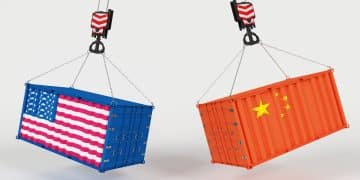US-China trade talks Switzerland: what to expect

The US-China trade talks address key issues such as trade imbalances, tariffs, and market access, with outcomes that could significantly impact businesses and the global economy.
US-China trade talks in Switzerland are generating buzz around the globe. With economic stakes so high, what can we anticipate from these discussions? Let’s dive in.
Overview of US-China trade relations
The US-China trade relations are complex and constantly evolving. Both countries hold significant power in the global economy, making their interactions crucial for trade and international markets.
Historical Context
Understanding the background of these relations helps clarify current issues. Trade between the US and China has developed rapidly over the last few decades. Initially, the relationship was built on cooperation, but it has faced many challenges.
The WTO membership in 2001 marked a significant turning point. It opened up Chinese markets to the world but also led to increased competition. Over time, trade imbalances became a prominent issue, with the US facing substantial deficits.
Current Trade Dynamics
Today, trade talks continue to focus on several key areas:
- Tariffs: High tariffs have been a significant point of contention. Both nations have implemented tariffs on numerous goods, impacting prices for consumers.
- Intellectual property: Concerns about theft and enforcement have created friction. The US maintains that China does not adequately protect intellectual property rights.
- Market access: The US seeks fair and reciprocal access to Chinese markets, while China aims to expand its exports.
Moreover, diplomatic relations influence these trade dynamics. Incidents of political tension often spill over into economic discussions. As both sides negotiate, observing this relationship’s progression is vital.
Implications for Global Trade
The implications of US-China trade relations extend beyond their borders. Disruptions in this trade can affect supply chains worldwide. Countries that depend on either the US or China for goods may face economic instability if relations worsen.
In the future, how these two nations interact will profoundly influence global markets. Businesses must stay informed about potential changes to adapt and thrive.
Key issues on the table for negotiations
In the ongoing discussions between the US and China, several key issues are at the forefront of negotiations. These topics are pivotal in shaping economic relations and addressing global concerns.
Trade Imbalances
One major concern is the significant trade imbalance. The US often imports far more from China than it exports. This imbalance has led to calls for more equitable terms. Addressing this issue could pave the way for a healthier economic relationship.
Intellectual Property Rights
Another crucial topic is the protection of intellectual property rights. The US has accused China of not doing enough to safeguard patents and copyrights. Strengthening these protections remains vital for companies operating in both markets.
- Enforcement mechanisms: Clear strategies for enforcing intellectual property laws must be established.
- Counterfeiting: The trade of counterfeit goods also needs to be addressed to protect both consumers and businesses.
- Innovation incentives: Encouraging innovation through proper protections is essential for both economies.
Furthermore, tariffs remain a hot topic. Both countries have implemented tariffs on various goods, causing prices to rise for consumers. Evaluating these tariffs is crucial for finding a resolution.
Market Access
Market access is another significant issue. The US aims to ensure that American companies can operate fairly in China. This includes reducing barriers that hinder competition. In return, China seeks better access to US markets for its products.
Additionally, discussions around technology transfer are important. The US is concerned about forced technology transfers as a condition for doing business in China. Creating fair practices in technology exchange will be necessary to foster trust and cooperation.
Overall, these key issues set the stage for complex negotiations. The outcome will have profound effects on economic relations between the two powers and the wider global market.
Impact of Switzerland as a neutral ground

The role of Switzerland as a neutral ground in US-China trade talks is significant. Known for its political neutrality, Switzerland offers a unique setting for delicate negotiations.
Historical Context of Neutrality
Switzerland’s long-standing history of neutrality allows it to facilitate discussions without bias. Since the 19th century, it has acted as a mediator for various international disputes. This history provides both the US and China with a trust factor, essential for open dialogue.
Benefits of Neutral Ground
Holding talks in a neutral location like Switzerland provides multiple advantages:
- Safe environment: Both parties can feel secure discussing sensitive issues without immediate political pressure.
- Equal footing: Switzerland allows for a balanced atmosphere where neither party has home-field advantage.
- International focus: The global community watches negotiations in Switzerland, adding pressure for a constructive outcome.
Moreover, the scenic and tranquil environment can lead to more productive discussions. The less stressful setting may encourage participants to think creatively and work towards solutions.
Global Significance
The outcomes of these negotiations can have wide-ranging impacts. A successful agreement can stabilize markets and foster economic cooperation. Switzerland’s status as a neutral facilitator thus extends beyond the immediate talks.
In this context, Switzerland stands as a symbol of diplomacy. The hopes for peaceful negotiations align with its reputation for fostering global cooperation. As such, the impact of this neutral ground is vital in shaping future trade relations.
Potential outcomes and their global effects
The potential outcomes of the US-China trade talks are significant and have far-reaching implications. As these two economic giants engage in negotiations, their decisions can influence not only their own economies but also the global marketplace.
Possible Positive Outcomes
If successful, the negotiations can lead to several benefits:
- Reduced tariffs: A decrease in tariffs could lower prices for consumers in both countries, promoting trade.
- Increased market access: Improved access for US businesses in China can enhance competition and innovation.
- Stronger economic ties: A mutual agreement may result in stronger partnerships that benefit businesses and workers alike.
Such outcomes could provide a boost to global economic growth, creating a more stable environment for international trade.
Potential Negative Consequences
On the other hand, failure to reach an agreement may lead to adverse effects:
- Heightened tensions: Continued disputes can escalate tensions, affecting diplomatic relations.
- Market instability: Uncertainty around trade policies can cause fluctuations in global markets, impacting investors and companies.
- Supply chain disruptions: An ongoing trade war may disrupt supply chains, affecting production and delivery worldwide.
The repercussions of these negotiations extend beyond the US and China. Countries that rely on trade with either nation could find themselves in challenging positions. For instance, nations in Southeast Asia may experience shifts in trade patterns depending on the outcomes.
Additionally, other global powers, such as the European Union, may feel compelled to respond to the changes in the US-China dynamic. This can lead to new trade deals or adjustments in existing agreements around the world. Therefore, the potential outcomes of these negotiations are crucial for shaping the future of global trade.
What this means for businesses in the US and China
The outcome of the US-China trade talks carries significant implications for businesses in both nations. As these two major economies negotiate, various sectors may either benefit or face challenges based on the results.
Opportunities for US Businesses
If the talks lead to favorable agreements, US companies could see enhanced market access in China. This might allow them to tap into one of the largest consumer markets in the world. Moreover, reduced tariffs on American goods could make products more competitive in Chinese markets. With lower costs, companies might experience increased sales and profitability.
Challenges Facing US Companies
Conversely, uncertainty in negotiations can create obstacles. Businesses may hesitate to invest if they feel the outcomes are unpredictable. This hesitation can slow down growth and expansion plans.
- Supply chain disruptions: Companies that rely on imports from China might face increased costs due to tariffs.
- Regulatory changes: Businesses may need to adapt to new regulations if trade policies change significantly.
- Loss of competitiveness: Companies that do not adapt quickly may fall behind competitors who can navigate changes more effectively.
Impacts on Chinese Businesses
For Chinese firms, successful negotiations could also mean better opportunities. Businesses could expand their exports to the US market without heavy tariffs, fostering growth. Improved relations may also lead to increased foreign investment, which can help drive innovation and efficiency.
However, failures in negotiations might result in heightened scrutiny of Chinese companies operating internationally. This could hinder their ability to expand and integrate into other markets. Some Chinese companies may also face challenges with compliance if new trade barriers are established.
Overall, the outcomes of these negotiations will significantly shape the business landscape for both US and Chinese firms, presenting them with both opportunities and risks.
FAQ – Frequently Asked Questions about US-China Trade Talks
What are the key issues in the US-China trade talks?
The key issues include trade imbalances, intellectual property rights, tariffs, and market access.
How could successful negotiations impact businesses?
Successful negotiations could lead to reduced tariffs and increased market access, benefiting companies in both countries.
What are the potential risks of failing to reach an agreement?
Failure to reach an agreement might heighten tensions and create market instability, impacting global trade.
Why is Switzerland a significant location for these talks?
Switzerland’s neutrality and reputation for diplomacy make it an ideal location for sensitive negotiations between both nations.





